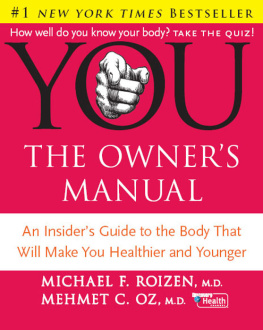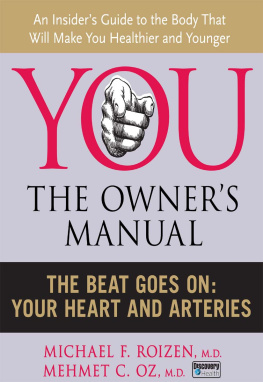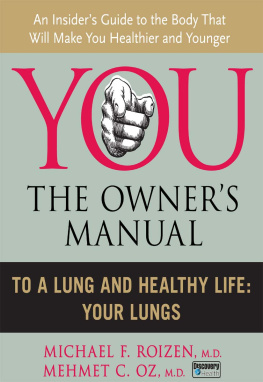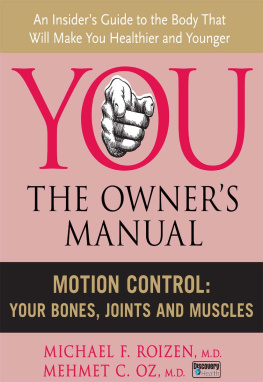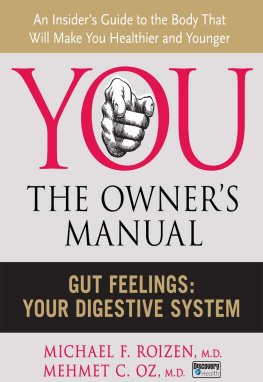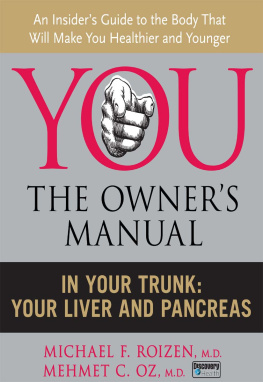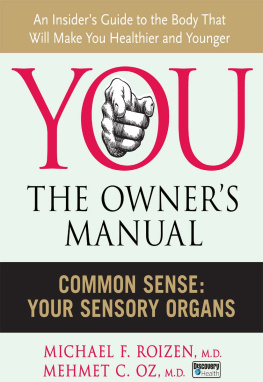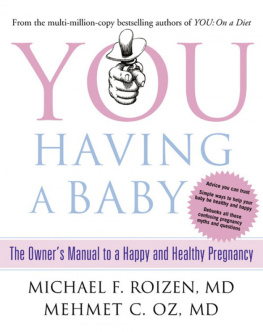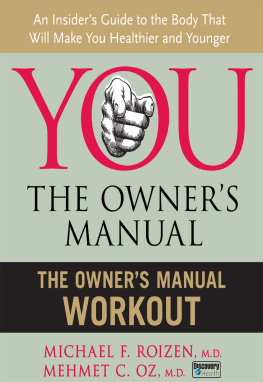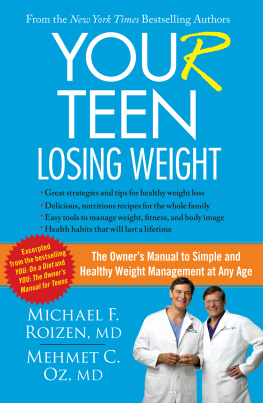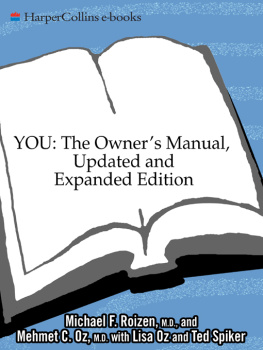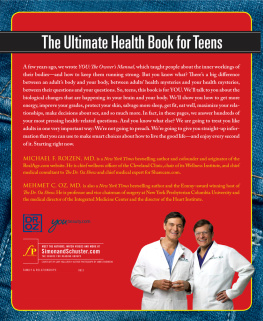Chapter 1
Your Body, Your Home: Super Health
B eautiful bodies sell magazines. Tattooed bodies attract gawkers. Well-trained bodies win championships (and lucrative endorsement contracts). Celebrity bodies get stalked by paparazzi, chronicled by tabloids, and lampooned by late-night talk-show hosts. Infomercials promise better bodies (Lose 700 pounds with this revolutionary belly button cream!). And now, even so-called flawed bodies star as the protagonists in one form of pop culture: plastic-surgery reality shows.
Theres no doubt that corporate America has capitalized on the fact that a beautiful body stimulates the economy as well as the hormones. Were all for admiring the body for its curves, angles, and ability to make Nielsen ratings soar. But maybe our obsession with skin belies the importance of everything that chugs, churns, and pounds underneath it. Because many people have developed a view of the human body thats more superficial than a paper cut, we want to step back and look deeperinto places where only surgeons, MRI machines, and the occasional tapeworm can see:
Inside your body.
Why? Because what goes on inside of your body is what gives you the ability to see, run, smell, have wild sex on the beach, feed babies, create dinosaurs out of Legos, surf, solve algebra problems, tie shoelaces, hum Margaritaville, and do the thousands of different things you do every day. Your body gives you life. Your body is life.
But even if you understand your bodys many functions, you may not really know how it functionsand, more important, how you can make it stronger, healthier, and younger.
Maybe thats because complex medical issues and scientific jargon race through our brains like cars on an interstatereports, data, and recommendations stream by so fast that you barely have time to notice them, let alone figure out what they all mean. The result of this information inundation is that spotting important health news is about as easy as finding a kernel of corn in a landfill. Then, to figure out which kernel of information you can apply to your own life, it takes digging, persistence, and time, not to mention some waders to protect yourself from all the junk thats out there. But its vital for your healthand your lifethat you own a pair of informational waders. With this book, weve strapped on our waders and have pulled out the kernels for you.
So you can live a healthier life.
So you can become the world expert on your body.
To do that, we want you to think of your body as a homeas your home. When we started thinking about the similarities between bodies and homes, we realized that the two have a more striking resemblance than the Olsen twins. Your house and body are both important investments. They both provide shelter to invaluable personal property. And theyre both places you want to protect with all your power. Thats the big picture. But if we explore the comparison even more and we will throughout this bookyoull understand the relationship even better. Your bones are the two-by-fours that support and protect the inner structure of your home; your eyes are the windows; your lungs are the ventilation ducts; your brain is the fuse box; your intestines are the plumbing system; your mouth is the food processor; your heart is the water main; your hair is the lawn (some of us have more grass than others); and your fat is all the unnecessary junk youve stored in the attic that your spouse has been nagging you to get rid of. If you can get past the fact that your forehead doesnt have a street number and that a two-story brick Colonial doesnt look all that good in a bathing suit, the similarities are remarkableso remarkable, in fact, that we believe you can learn about how your body works by thinking about how your house does.
And thats really the, uh, foundation for this book: Knowing your body gives you the power to change it, maintain it, decorate it, and strengthen it. In each chapter, well start by explaining the anatomy of your bodys major organs. To do that, well take you insideand show you how your bodys organs operate and interact with each other. We wont do it in doctor-speak, but we also wont treat you like youre a fourth-grader. Were not going to make the science simplistic; were going to make it simple. From there, were going to tell you how to make your organs function betterso you can prevent disease and live a younger, healthier life. Well show you how disease starts, how it affects your body, and how you can learn to fend off and beat problems and conditions that can threaten not only your life but also your quality of life.
To return to the house analogy, we want you to take the same approach to basic body maintenance and repairs as you do in your home. You dont call the plumber if you have a little backup in your pipes. You try a plunger, lift the back off the toilet and fiddle with the floating ball, and try to remedy the problem yourself. You dont call the exterminator when you spot a fly in the kitchen. You dont call the electrician if a lightbulb burns out. You rely on yourself for maintaining control over how your house agesbecause you know that its less expensive to prevent problems and treat minor ones than let everything deteriorate to the point where your house needs a major overhaul to continue functioning properly.
Ultimately we want you to get comfortable enough with your own body so that youll feel confident with basic body maintenance, so that youll avoid the things that cause the most wear and tear and do the things that best maintain the long-term value of your body.
To do that, well show you such things as how your arteries clog, why you cant remember where you put your keys, how to have a more satisfying sex life, how to exercise your heart and bones, why your immune cells fight some diseases and not others, and what you can see on a tour inside your intestines (we told you we had waders). Well explore your whole body so you can see how it works, as well as how to make it work better.
As you read this book, we hope that you learn a lot, laugh a little, and find the things in your life that you can change to take complete control of your health. Before we start, we think its important to know a little bit more about the major principles and goals of You: The Owners Manual. Here, we want to outline the most important things about healthabout super healththat we want to pass along to you in this journey through the body.
YOU Control Your Health Destiny
If this world didnt have doctors, thered probably be no such thing as quadruple bypasses, laser eye surgery, or illegible handwriting. But for all the wonderful things that organized medicine providesfrom amazingly advanced treatments to cuttingedge research that will someday cure incurable diseasesthis book isnt about organized medicine. Its not a guide to treatments, and its not a textbook or encyclopedia. Think of it as a manual for prevention. Your manual for preventing the effects of agingby keeping you feeling, looking, and being younger than your calendar age. Doctors will be the first ones to tell you that they cant keep you from getting heart disease, or put sunblock on your nose before a noontime run, or snatch the third Twinkie out of your paw before you torpedo it down your throat.
But you can.
You can control your health destiny. Just look at the way Lance Armstrong has done it. In 1996, the champion cyclist had tests that revealed advanced testicular cancer that had spread to his lungs and brain. With a far less than 50 percent chance of survival, Armstrong endured surgeries and an aggressive form of chemotherapy to treat his cancer. Armstrong was left weakyet determined. Combined with medical treatments, Armstrongs own willpower and the support of the people around him gave him the strength to fight, to beat cancer, to become the record-breaking sixtime Tour de France champion, and most important, to inspire, help, and motivate millions of other people (just look at all those yellow LIVESTRONG wristbands!). One of the great many lessons weve learned from Armstrong is that while you cant always control what happens to you (no matter how fit you are), there are some things you can control: your attitude, your determination, andwhat serves as the crux of this bookyour willingness to take your health into your own hands and know as much about your body as possible.

